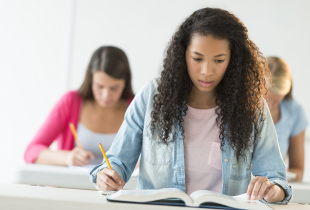
Today’s news review examines coverage of two reports on the life experiences of girls and school nurses' workload.
Life experiences of girls
Today, 12 September, Plan International UK has published a report into the life experiences of girls. The report looks at the factors affecting girls including educational attainment, teenage pregnancy, body image and poverty. The report suggests that there is a geographical divide when it comes to girls' future prospects with girls living in inner city areas performing worst and those from the southeast performing best.
The report has been covered widely in the Guardian, Times, Sky News online, Daily Telegraph, Daily Mail, the Sun, the Mirror, the Mail and i.
We are clear that schools and colleges have an important role to play in supporting the well-being and mental health of children and young people, through the development of approaches that suit the particular needs of their pupils. We are helping schools to do this through:
- Teaching pupils about mental health and emotional wellbeing, as part of a developmental PSHE education curriculum.
- Publishing a blueprint for school counselling services, providing schools with practical, evidence-based advice, informed by experts, on how to deliver high quality school-based counselling.
- Issuing advice on behaviour and mental health which provides teachers with information and tools that will help them to identify pupils who need help, provide effective early support and understand when a referral to a specialist mental health service may be necessary.
We have also introduced a more rigorous curriculum so every child, regardless of their background, learns the basics they need such as English and maths so they can go on to fulfil their potential whether that’s into the world of work or continuing their studies, and encouraging more young people, particularly girls, to study STEM subjects.
A Government spokesperson said:
We are committed to building a country that works for everyone – no girl should be held back in life just because of her gender or where she lives. We have given schools clear guidance on sex and relationship education and products to help them discuss body image with their pupils, so they can learn to respect themselves and others.
Teenage pregnancy rates are at the lowest level for 40 years and we are driving down child poverty, with the number of children living in workless households at a record low. But we want to do more which is why we are encouraging more young people, particularly girls, to study STEM subjects and working to eliminate the gender pay gap.
School nurses
The Office of the Children’s Commissioner (OCC) published a report today, Monday 12 September, on the workload balance of school nurses.
The findings suggest that school nurses spend twice as much time on paperwork as on direct work with children in schools and would like more support from local authority children’s services.
The report was covered in the Daily Telegraph, BBC Online, Sun, Metro, TES, i and Daily Mail. This was also briefly covered on the Today Programme this morning.
We know that referrals to children’s social care services are 5.3% higher than they were in 2010, with children in need 4% higher than in 2010. In addition, the number of child protection enquiries is now at a record high (up over 12% on the previous year), as is the number of children in child protection plans (up over 4% on the previous year).
This shows that local authorities are carrying out more investigations where they have cause to suspect a child is suffering, or is likely to suffer, significant harm, and taking steps to protect children where investigations show that is needed.
A Department for Education spokesperson said:
School nurses have an important role to play in protecting children from harm, and any concerns about a child’s welfare should be referred to councils’ children’s social care teams.
We know the system works best when professionals are working together and that’s why, through the Children and Social Work Bill, we are placing a duty on health professionals, police and local authorities to work together to ensure every child gets the vital support they need.
Follow us on Twitter and don't forget to sign up for email alerts